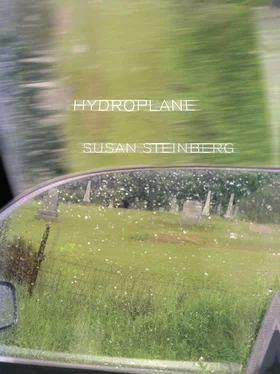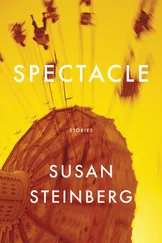Susan Steinberg - Hydroplane - Fictions
Здесь есть возможность читать онлайн «Susan Steinberg - Hydroplane - Fictions» весь текст электронной книги совершенно бесплатно (целиком полную версию без сокращений). В некоторых случаях можно слушать аудио, скачать через торрент в формате fb2 и присутствует краткое содержание. Год выпуска: 2006, Издательство: Fiction Collective 2, Жанр: Современная проза, на английском языке. Описание произведения, (предисловие) а так же отзывы посетителей доступны на портале библиотеки ЛибКат.
- Название:Hydroplane: Fictions
- Автор:
- Издательство:Fiction Collective 2
- Жанр:
- Год:2006
- ISBN:нет данных
- Рейтинг книги:4 / 5. Голосов: 1
-
Избранное:Добавить в избранное
- Отзывы:
-
Ваша оценка:
- 80
- 1
- 2
- 3
- 4
- 5
Hydroplane: Fictions: краткое содержание, описание и аннотация
Предлагаем к чтению аннотацию, описание, краткое содержание или предисловие (зависит от того, что написал сам автор книги «Hydroplane: Fictions»). Если вы не нашли необходимую информацию о книге — напишите в комментариях, мы постараемся отыскать её.
Hydroplane: Fictions — читать онлайн бесплатно полную книгу (весь текст) целиком
Ниже представлен текст книги, разбитый по страницам. Система сохранения места последней прочитанной страницы, позволяет с удобством читать онлайн бесплатно книгу «Hydroplane: Fictions», без необходимости каждый раз заново искать на чём Вы остановились. Поставьте закладку, и сможете в любой момент перейти на страницу, на которой закончили чтение.
Интервал:
Закладка:
I sat beneath my window, fingers wilted in the grass until the rain stopped, the sun rose, my mother left for work.
Indecent, they whispered behind their hands.
Not me. Their girls.
This time I would say it.
Animals.
Brainless.
And I would run to my car, my mother steaming in the doorway, Where do you think you're going so soon, you ungrateful.
Let her go.
I would drive the way home and never return.
I would say, Look, I've let you go.
I would laugh alone. I'm funny, I would say.
I laughed aloud in the ladies'.
The girl turned off her faucet.
So it was her in the mirror, alone, you see.
So I turned my faucet to be with her.
I felt it when she looked at me.
I can explain her look.
It was good for something.
So I looked back.
But she was gone from the mirror, rushing past me, drying her hands on her Chinese flowers.
She reached for the doorknob and pulled.
I wanted to say, Not yet, Wait.
I wanted to say, The rain.
She left streaks of wet across her dress.
She was gone from the room in a rush.
And I was brilliant, lord, in the mirror.
I was static, poised, drying out in the light.
The Last Guest
The last guest, the redhead, late and standing in the doorway, the door half open so that only half of him is seen before he pushes the door to fully open, as he can do this if he wants, as he can push the door to fully open as he's been invited by the hostess and is, therefore, never needing to knock, but needing only to push the door.
The last guest standing in the doorway, pressing out his cigarette on the vestibule wall, letting the cigarette drop, crushed, in a spray of sparks to the vestibule floor, then shaking his raincoat from his shoulders, the raincoat sliding to his elbows, then to his wrists, then to his fingers.
The hostess drunk already as it's late and as it's her place and as she spent the better part of the week setting up for this evening with help from her two friends, lugging bags of bottles and candles into the house and painting walls and pounding nails into the walls and cleaning sinks and shaking rugs, and hoping, it's clear to me, that no one will ruin the evening, as things are as they should be, crowded, candlelit, somewhat drunken, and knowing, as I do, that things often get ruined by other things, by an over-drunk guest, for instance, knocking into walls or slipping on a rug or climbing the staircase to an upstairs place to wake the neighbors who sit at home alone in the evenings, the neighbors who peer through their peepholes, rather than open their doors, and who call the cops, insisting that the music be shut down, that the crowd disperse, that the hostess sit alone on her bed for the rest of the evening as she does many evenings.
The last guest crossing the threshold, pushing through the crowd, pushing through the room where I sit by a window, pushing through the kitchen where the hostess sees him pass and straightens, then pushing into the bedroom of the hostess where he drops his wet raincoat to the pile of wet coats piled high on the bed.
The hostess hoping, mostly, it seems, that this redhead will show, made obvious in her sudden though sloppy alertness when he crosses the threshold late and she attempts to straighten her sloppy stance, then attempts to follow him through the crowd in her tight backless dress, wobbling on pencil-thin heels, and made up, I don't have to say like what, just heavily, though fading, running, will suffice, and pushing, too, through the crowd as if on a mission, pushing everyone out of her way, saying, Has anyone seen my cat, looking to the floor as if for the cat, then up to the face of the last guest to arrive whom she stops, pressing her palm flat to his chest, on his way from the bedroom where he has left his raincoat on the top of the coat heap, Have you seen my cat, No.
Arriving early and knocking on the door, and the hostess saying, Help yourself, to a drink, to a chair, and helping myself to the chair by the window in a room as no one else sits yet in that room and as the chair faces the door to the vestibule where one can watch guests arrive and push into the bedroom where they leave their wet coats on the bed.
Knowing none of the guests, not even knowing, really, the hostess, who rarely utters more than an occasional weak hello, eyes averted, in the vestibule or out on the grass.
His red hair, this last guest, from where I sit watching him talk to the hostess, who strikes a match for his cigarette and who clutches his elbow when a heel goes wobbly, this one's red hair reminding me of a boy from seventh grade, a new kid with hair the same shade of red, and the same translucent eyes and lashes, and uncanny the sameness in the shape of the face, this guest pushing through with those same thin hips, the same liquid swagger, first one jutting hipbone then the other, a sort of swivel, which reminds me, also, of another kid from seventh grade, a boy-looking girl I hang out with before the day I move with my mother to another place for a different school, for eighth grade that is, the detail to remember, the move for eighth, as I have been taken by my mother from the first school and its bad influence, this boy-looking girl who says of this redheaded kid at school, Firebush, whispering it into my ear in every class he's in with us, especially science as we sit behind him and see how the hair molds to his neck in small flame-shaped waves, and we are no good anyway with science, Firebush, when he walks past in the hallway holding his books loosely, walking in that liquid swagger, that cocky fuck-you walk I fall for, Firebush, her lips pressed to my ear.
Two cops shining flashlights in the window near the chair where I sit, and striking, with the flashlights' lightbeams, his red hair across the room, so that for a moment his hair glows as if on its own, as if the light shines from within his head or from within each thread of hair, looking like not just fire but something more, the sun, perhaps, or some kind of holy fire rather than some scientific fire, more like a painted golden halo of sorts and less like the fire burning in science off a curl of soft metal, and if you look it blinds you says the teacher, and so we look, and the hostess noticing, too, this golden halo and looking startled into his lighted hair before noticing the lightbeams, how the light just comes from flashlights shining from the other side of the window, and the hostess saying, Shit, the cops.
Smoking in this boy-looking girl from seventh grade's bedroom the thin, brown cigarettes her mother smokes and leaves in packs on the kitchen table for us to steal, not meaning for us to steal them, but not understanding how we cannot resist any temptation, including smoking, including starting fires in the basement, including calling this new kid on the telephone from this girl's dismal bedroom, this new kid whose mother is now the crossing guard at school and wears blue cop-pants and stands on the corner outside their house to help us cross the street, but we never cross at the corner knowing we are too old to need help crossing a street and would rather cross a block away and cut through her backyard garden and hide behind the neighbor's tree hoping we will see the new kid walk out from his house, but we never do, and calling him after school, whispering into the telephone through a thin sweater to muffle our voices, Can we come over, Can we touch your firebush.
Living above the hostess and often hearing her in her bedroom from my bedroom crying to her friends on the telephone in the evenings that no one likes her in the way she wishes one would like her.
The cops knocking hard on the door and asking the two friends of the hostess who answer the door if they can please get the hostess, the cops' stiff hats in their hands dripping rainwater onto the vestibule floor, and the hostess walking wobbly in her pencil-thin heels and tight backless dress, holding a dishtowel to use to dry the floor, which gets wetter the more the cops stand there dripping and dripping, and the hostess saying, Hiya fellas, and the cops saying, Turn down the music, We've had complaints.
Читать дальшеИнтервал:
Закладка:
Похожие книги на «Hydroplane: Fictions»
Представляем Вашему вниманию похожие книги на «Hydroplane: Fictions» списком для выбора. Мы отобрали схожую по названию и смыслу литературу в надежде предоставить читателям больше вариантов отыскать новые, интересные, ещё непрочитанные произведения.
Обсуждение, отзывы о книге «Hydroplane: Fictions» и просто собственные мнения читателей. Оставьте ваши комментарии, напишите, что Вы думаете о произведении, его смысле или главных героях. Укажите что конкретно понравилось, а что нет, и почему Вы так считаете.












